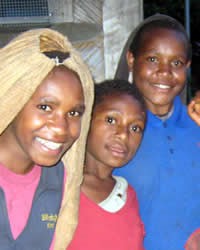The Baruya/Yipma language area spans as far north as Wonenara, as far West as Pinji and Sindeni, as far East as Marawaka and Yamuru, and as far south as Aanjaneva (Aasanaave) in the SE corner of the Eastern Highlands Province of Papua New Guinea.
Most of the Wusuraambya/Baruya/Yipma dialects are very similar to each other except Pinji which is a significant variant. (Pinji is located west of Marawaka between Usirampia and Wonenara). It does not seem to be visible on Google Earth yet.
Most people in the area live in traditional round houses or cottage style houses with woven bamboo exterior walls, woven "pitpit" (wild sugar cane) for inside walls, grass roofs, fire pits in the middle of each house, usually raise above ground enough to store firewood underneath the houses.
Round houses do not have windows or ventilation. Cottage style houses do generally have some sort of make-shift window (occasionally glass but more commonly plank doors over the windows).
People live off their gardens. Coffee provides a meagre income for some but most of the revenue is used up in shipping. Many of the male population live in towns such as Port Moresby, Kimbe, Goroka and others and take jobs as security guards or stocking shelves in the stores. The money they are able to save goes to family for education and other basic needs such as clothing, soap, and some very basis food items.
Those with money might add rice, tin fish, drippings, Magi noodles and a few other basic items to their menu. Those without will live off their gardens eating sweet potatoes, taro, tapioca root, corn beans, various greens, bananas, sugar fruit, peanuts, tree tomatoes, cucumbers, oranges, tangerines, lemons, etc.
Until around 1990 the people commonly wore grass or bark skirts, bark capes, various arm bands, headdresses, necklaces and other apparel. Since the government school was started in 1989 the people began the transition to western clothing which most wear now.
Historically the people were animistic, living in fear of many different spirits. Sorcery and witchcraft including services provided by witch doctors were common. Since the first churches entered the area most of the animistic beliefs have fallen away, along with the fear that had kept them indoors at night. The government aid posts have replaced the witch doctors and many now believe in the God of the Bible. Many have accepted Jesus as Lord and Savior.
Scripture Prayers for the Baruya in Papua New Guinea.
| Profile Source: Anonymous |










